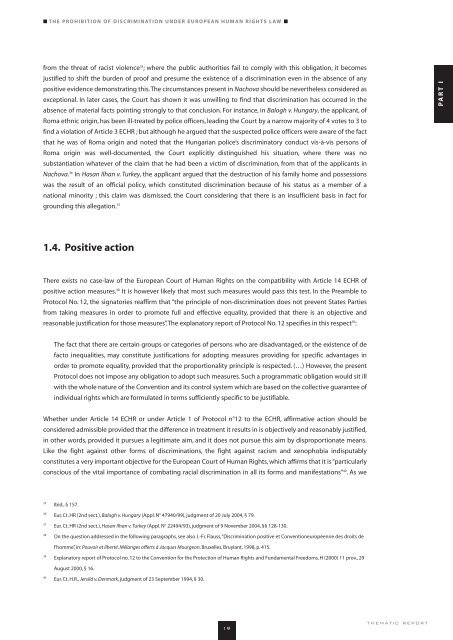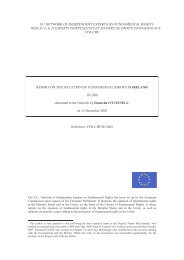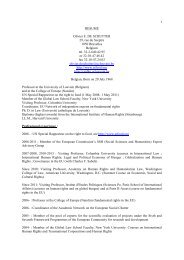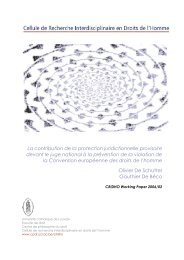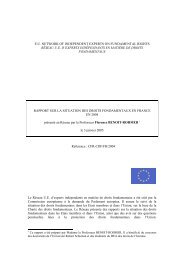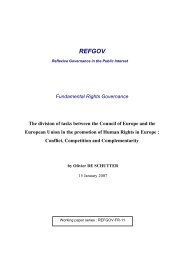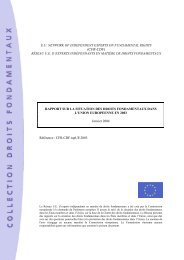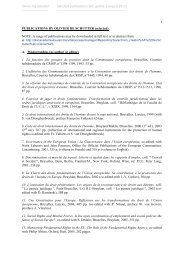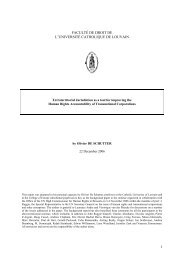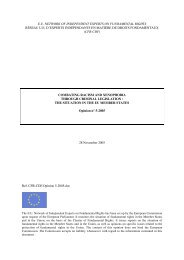The Prohibition of Discrimination under European Human ... - cridho
The Prohibition of Discrimination under European Human ... - cridho
The Prohibition of Discrimination under European Human ... - cridho
Create successful ePaper yourself
Turn your PDF publications into a flip-book with our unique Google optimized e-Paper software.
■ THE PROHIBITION OF DISCRIMINATION UNDER EUROPEAN HUMAN RIGHTS LAW ■<br />
from the threat <strong>of</strong> racist violence35 ; where the public authorities fail to comply with this obligation, it becomes<br />
justified to shift the burden <strong>of</strong> pro<strong>of</strong> and presume the existence <strong>of</strong> a discrimination even in the absence <strong>of</strong> any<br />
positive evidence demonstrating this.<strong>The</strong> circumstances present in Nachova should be nevertheless considered as<br />
exceptional. In later cases, the Court has shown it was unwilling to find that discrimination has occurred in the<br />
absence <strong>of</strong> material facts pointing strongly to that conclusion. For instance, in Balogh v. Hungary, the applicant, <strong>of</strong><br />
Roma ethnic origin, has been ill-treated by police <strong>of</strong>ficers, leading the Court by a narrow majority <strong>of</strong> 4 votes to 3 to<br />
find a violation <strong>of</strong> Article 3 ECHR ; but although he argued that the suspected police <strong>of</strong>ficers were aware <strong>of</strong> the fact<br />
that he was <strong>of</strong> Roma origin and noted that the Hungarian police’s discriminatory conduct vis-à-vis persons <strong>of</strong><br />
Roma origin was well-documented, the Court explicitly distinguished his situation, where there was no<br />
substantiation whatever <strong>of</strong> the claim that he had been a victim <strong>of</strong> discrimination, from that <strong>of</strong> the applicants in<br />
Nachova. 36 In Hasan Ilhan v. Turkey, the applicant argued that the destruction <strong>of</strong> his family home and possessions<br />
was the result <strong>of</strong> an <strong>of</strong>ficial policy, which constituted discrimination because <strong>of</strong> his status as a member <strong>of</strong> a<br />
national minority ; this claim was dismissed, the Court considering that there is an insufficient basis in fact for<br />
grounding this allegation. 37<br />
1.4. Positive action<br />
<strong>The</strong>re exists no case-law <strong>of</strong> the <strong>European</strong> Court <strong>of</strong> <strong>Human</strong> Rights on the compatibility with Article 14 ECHR <strong>of</strong><br />
positive action measures. 38 It is however likely that most such measures would pass this test. In the Preamble to<br />
Protocol No. 12, the signatories reaffirm that “the principle <strong>of</strong> non-discrimination does not prevent States Parties<br />
from taking measures in order to promote full and effective equality, provided that there is an objective and<br />
reasonable justification for those measures”.<strong>The</strong> explanatory report <strong>of</strong> Protocol No. 12 specifies in this respect39 :<br />
<strong>The</strong> fact that there are certain groups or categories <strong>of</strong> persons who are disadvantaged, or the existence <strong>of</strong> de<br />
facto inequalities, may constitute justifications for adopting measures providing for specific advantages in<br />
order to promote equality, provided that the proportionality principle is respected. (…) However, the present<br />
Protocol does not impose any obligation to adopt such measures. Such a programmatic obligation would sit ill<br />
with the whole nature <strong>of</strong> the Convention and its control system which are based on the collective guarantee <strong>of</strong><br />
individual rights which are formulated in terms sufficiently specific to be justifiable.<br />
Whether <strong>under</strong> Article 14 ECHR or <strong>under</strong> Article 1 <strong>of</strong> Protocol n°12 to the ECHR, affirmative action should be<br />
considered admissible provided that the difference in treatment it results in is objectively and reasonably justified,<br />
in other words, provided it pursues a legitimate aim, and it does not pursue this aim by disproportionate means.<br />
Like the fight against other forms <strong>of</strong> discriminations, the fight against racism and xenophobia indisputably<br />
constitutes a very important objective for the <strong>European</strong> Court <strong>of</strong> <strong>Human</strong> Rights, which affirms that it is “particularly<br />
conscious <strong>of</strong> the vital importance <strong>of</strong> combating racial discrimination in all its forms and manifestations” 40 .As we<br />
35<br />
36<br />
37<br />
38<br />
39<br />
40<br />
Ibid., § 157.<br />
Eur. Ct. HR (2nd sect.), Balogh v. Hungary (Appl. N° 47940/99), judgment <strong>of</strong> 20 July 2004, § 79.<br />
Eur. Ct. HR (2nd sect.), Hasan Ilhan v.Turkey (Appl. N° 22494/93), judgment <strong>of</strong> 9 November 2004, §§ 128-130.<br />
On the question addressed in the following paragraphs, see also J.-Fr. Flauss,“<strong>Discrimination</strong> positive et Conventioneuropéenne des droits de<br />
l'homme”, in: Pouvoir et liberté. Mélanges <strong>of</strong>ferts à Jacques Mourgeon, Bruxelles, Bruylant, 1998, p. 415.<br />
Explanatory report <strong>of</strong> Protocol no. 12 to the Convention for the Protection <strong>of</strong> <strong>Human</strong> Rights and Fundamental Freedoms, H (2000) 11 prov., 29<br />
August 2000, § 16.<br />
Eur. Ct. H.R., Jersild v. Denmark, judgment <strong>of</strong> 23 September 1994, § 30.<br />
19<br />
thematic report<br />
PART I


